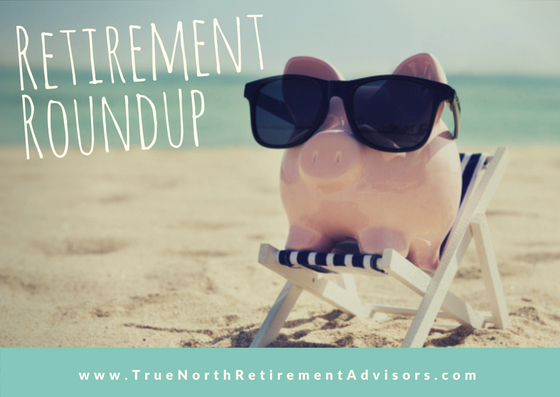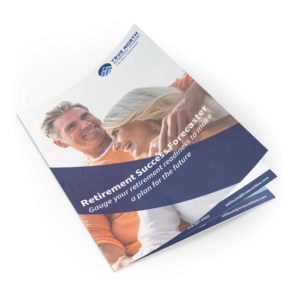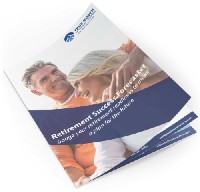
Articles and ideas to help you live a fulfilled life!
In this month’s Retirement Roundup, we’ve curated our favorite articles from around the web to help you plan for and live successfully in retirement!
We start off with an interesting article about the next recession and when it might be coming, according to economists – maybe soon! We follow that up with the a look at rising interest rates on mortgages. This will be particularly insightful if you are looking to purchase or refinance a home in the near future.
Then, we switch gears and focus on the risks involved with investing in startups. The SEC is considering lifting some restrictions and we are not in favor… find out why. Next, we discuss impulsive spending and what you can do to avoid it. We’ve all been in that situation and have regretted it later. We discuss are 5 helpful tricks that can help curb your impulses!
We then take a look at the real cost of owning a dog and a genius hack for getting your water through security at the airport – someone has cracked the code!
Lastly, we send you off into your week with a touching video from centenarians who have lived through two World Wars and have faced enormous tragedy. Get life lessons from these 100-year-old’s and find out what the secret to living a long life is!
Enjoy this month’s installment of the Retirement Roundup!
The Next Recession Is Coming by 2021, According to an Overwhelming Majority of Economists
(Jeff Kearns, Time)
A new survey, from the National Association for Business Economics, claims that two-thirds of economists in the U.S. expect a recession to begin by the end of 2020. More precisely, about 10 percent see the next contraction starting in 2019, 56 percent say 2020, and 33 percent said 2021 or later.
Many economists in the survey believed that trade policy was the greatest risk to the current economy. According to the article: “On the brighter side, 33 percent of respondents said the biggest potential driver of a stronger economic performance is corporate tax reform, 27 percent cited stronger wage gains and 10 percent said stronger global growth.”
Even though this economic expansion is quite long already (in May, it became the 2nd longest on record), it’s important to keep in mind that plenty of the drivers for further economic growth. – lower taxes, a solid job market, strong housing, and growing business profits – all bode well for continued expansion into next year.
U.S. housing market faces ‘5-percent’ test
(Richard Leong, Reuters)
The interest rate on 30-year mortgages rises to 5% for the first time in years. The 5% mark will be an important test for housing. Higher interest rates mean that homes become less affordable, as monthly mortgage payments for homeowners climb higher.
Even though housing prices have continued to climb, housing affordability has remained stable since interest rates have stayed low. But that’s beginning to change now that rates have been steadily marching higher over the last 2 years.
According to the article: “The rise in mortgage rates so far this year means a potential home buyer would pay about $35,000 more interest on a $220,000 loan over 30 years.”
It’s not doom and gloom for housing yet. Aaron Terrazas, senior economist at Zillow in Seattle, says “We need to see rates rise another 100 basis points to see a substantial drag.”
New home sales and housing prices continue to climb, so buyers don’t seem to be balking at 5% rates yet.
It Could Get a Lot Easier to Invest in Startups. Here’s Why That’s Bad
(Ryan Derousseau, Time)
Historically, venture capital, hedge fund, and more speculative investment opportunities have only been accessible to “accredited investors” – those with over $1 million in net worth and over $200,000 in income.
The thought process behind this restriction is that venture capital is very high risk, and the SEC wants to protect investors who have smaller sums of money to invest. If middle-class Joe Investor puts his entire $50,000 IRA into a hot, new biotech startup his neighbor keeps bragging about, he’s less likely to be able to recover financially from that loss if the biotech startup blows up.
There isn’t a lot of information or transparency about many start-ups, yet according to the article: “Last month, Securities and Exchange Commission Chairman Jay Clayton stated that the agency would research reducing restrictions on those defined as ‘accredited investors.’”
Since the SEC is charged with looking out for investors, we don’t think this is a good move. The restrictions are there for a reason – to protect investors who cannot afford to lose on such high-risk investments – and we think it should stay that way.
How to Curb Impulse Spending
(Daniel Packer, sweatingthebigstuff.com)
Impulse spending is an issue for many of us. Just this morning, after dropping my kids off at their grandma’s house, I was in a good mood and I was feeling like a little treat – a matcha green tea latte.
It didn’t take much convincing. 10 minutes and $5 later, my impulse was satisfied (for now).
Sometimes it’s so hard to suppress our impulses, but there are 5 techniques Daniel Packer presents in his blog post that can help:
- Use cash. Studies show that we spend less (a lot less!) when we pay for something with cash. Dave Ramsey is a huge advocate for paying in cash via an envelope system and rightly so – it works.
- Make a list. This is a strategy that works extremely well for me. Whenever I go shopping, I bring a list. I tell myself that I can only buy one thing that is not on my list. Unless I’m at Target. Then no strategy will work. I’m not leaving there with less than 12 things that I don’t need and never intended to buy.
- Sleep on it. Ahhh, the ultimate antidote to impulse purchases. Tell your impulse: “Be quiet. I’m gonna deal with you tomorrow.” This is a great one for online purchases. Go ahead, put it in your cart. Then wait a few days or a week and see if you still really want it. Personally, I love this strategy and I use it all the time. I had a pair of flip flops in my Amazon “saved for later” cart for over a year. I finally deleted them because I realized I didn’t want them as much as I originally thought.
- Compare costs with your real wage. According to Packer, “You probably know how much money you make in an hour. Don’t forget that number when it comes time to shop.”
- Remember your goals. Impulse buying provides very short-lived pleasure. But saving for a longer-term or bigger goal – like retirement or that bucket list vacation – is much more satisfying. Awareness of longer-term goals can help reduce impulse responses.
Cost of Owning A Dog
(FiscalTiger)

Dave’s dog, Reagan, who passed away in August
Dave lost his dog, Reagan, in August, and is considering getting another dog. We’re all “dog people” here at True North – collectively, we own 9 dogs! And if you visit our office, you’ll meet our office dog, Mia.
We love our dogs, but in addition to the responsibilities and time commitment of owning a dog, they can also be quite expensive to feed, groom, and keep happy.
The one-time cost of buying or adopting a dog is an estimated $1,705. When you consider the breeder/adoption fees, shots, collar, leash, Halloween costume, chew toys, a bed, licensing, etc., it really adds up.
FiscalTiger breaks down both the one-time cost and the ongoing costs which add up to about $2,405/year.
How to Bring Your Drink Through Airport Security
(Katherine Lagrave, Conde Nast Traveler)
Yes, this is actually possible. And someone has cracked the code!
According to the article: “All liquid items must meet the TSA’s 3-1-1 rule, meaning they need to be in 3.4-ounce containers (or smaller) and then placed in one clear, quart-sized bag. But what happens when a liquid becomes a solid? As long as the item is “frozen solid when presented for screening,” it’s allowed according to the TSA. And we don’t mean frozen on the way to slushie—no, we mean completely frozen, as the TSA also states that any items that are “partially melted, slushy, or have any liquid at the bottom of the container” will be subjected to the aforementioned 3-1-1 rule. As always, the TSA agent has the final say on whether or not the frozen item passes muster.”
Genius.
However, in practical terms, that bottle of water you want to bring through airport security is still likely to be frozen when you want to start drinking it. In the end, it may be more practical to cough up the dough for a bottled water after you go through security.
Life Lessons From 100-Year-Olds
(LifeHunters)
The world population of centenarians (those who live to be 100 or older) is expected to jump eightfold by 2050! What are the secrets of living to 100?
In this touching, simple, and honest video, several centenarians share their secrets. These centenarians have seen two World Wars, faced enormous tragedies (one woman recounts her experience of losing twin babies), and yet, they remain vibrant and optimistic about life.
Cliff, who’s 101 years old stated: “I’ve been retired now for 38 years. It always pleases me, though, that I can keep robbing the government with my pension.”
What is most striking about the people interviewed, is their positive outlook. They say they’ve “always been lucky” and have had a “relatively easy life.” And when asked how they feel today: “Strong.”
THANKS FOR READING!
Did you enjoy reading this? Do you want more content like this delivered to you each week?
>>CLICK HERE TO SUBSCRIBE TO OUR NEWSLETTER <<
Connect with us on Social Media
When you “like” our Facebook page and/or subscribe to our YouTube channel, you can leave questions and comments on these articles. Chances are, if you have a question or need some more clarification, someone else does too!
Disclosure:
The views outlined in this newsletter are those of True North Retirement Advisors (TNRA) and should not be construed as individualized or personalized investment advice or tax advice. TNRA are not licensed tax consultants, please contact your CPA for advice on your specific tax situation. Any economic and/or performance information cited is historical and not indicative of future results. Economic forecasts set forth may not develop as predicted.
Different types of investments involve varying degrees of risk, and there can be no assurance that the future performance of any specific investment, investment strategy, or product made reference to directly or indirectly, will be profitable, equal any corresponding indicated historical performance level(s), or be suitable for a given client or portfolio.
Investing in stocks includes numerous specific risks including the fluctuation of dividend, loss of entire principal and potential illiquidity of the investment in a declining market. Bonds are subject to market and interest rate risk if sold prior to maturity. Bond and bond mutual fund values and yields will decline as interest rates rise and bonds are subject to availability and change in price.
Any questions regarding the applicability of any specific issue discussed above should be addressed with TNRA. All information, including that used to compile charts and/or tables, is obtained from sources believed to be reliable, but TNRA has not verified its accuracy and does not guarantee its reliability.
Moreover, you should not assume that any discussion or information contained in the newsletter serves as the receipt of, or as a substitute for, personalized investment advice from TNRA or from any other investment professional. To the extent that you have any questions regarding the applicability of any specific issue discussed above to your individual situation, you are encouraged to consult with TNRA or the professional advisor of your choosing. All information, including that used to compile charts, is obtained from sources believed to be reliable, but TNRA has not verified its accuracy and does not guarantee its reliability.





